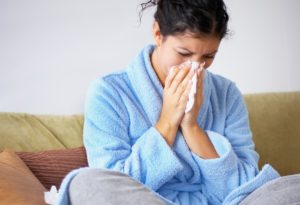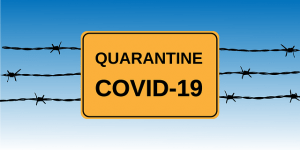The symptoms of Covid-19 Coronavirus vary greatly, and being underestimated in many countries means that many people may have already had Coronavirus without having received a diagnosis. Is it possible to find out and how should you behave if you think infected?
Find out the main questions and answers about Coronavirus with the experts:
- Dr. Dacid Buchholz
Senior founding medical director, primary care, assistant professor of pediatrics, Irving Medical Center Columbia University
- Dr. William Hillmann,
Associate medical director of Massachusetts General Hospital
1 - Is there any way of knowing if someone has had the Covid-19 Coronavirus in the past?

Dr. William Hillmann: At the moment, we don't have a test to say that. We are developing antibody tests to verify a previous infection, but they are not yet ready for clinical use. The only definitive way to know that you are infected is to take the test while the symptoms of Coronavirus are in your system and have that test positive.
2 - Could I have had the symptoms?

Hillmann: Coronavirus is actually quite a significant spectrum of symptoms, from people who have the symptoms completely and have no idea they have it to people with very mild cold-like symptoms - runny nose, congestion, sore throat - to people with more symptoms. Flu-like symptoms - high fever, muscle aches, shortness of breath and cough. All the way to people with serious illnesses, who we are seeing in hospital with respiratory failure, requiring ICU care. (Editor's note: recent reports suggest that loss of smell and taste are also signs of Covid-19 infection).
3 - What is the percentage of symptoms?

Dr. David Buchholz: At the moment, in New York, we are only testing the sickest people possible. We have no idea yet. However, there was a study in Iceland, which tested [a large segment of their] population, and 50% of the people who tested positive for Coronavirus had no symptoms.
4 - People with the symptoms of Coronavirus Covid-19 are also contagious?

Hillmann: A significant proportion of people with the symptoms are contagious for part of the time. We just don't know [for how long] at the moment, because we don't have the kind of test available to screen for infections with symptoms.
When people are symptomatic, they are contagious. A day or two before they become symptomatic, they are probably contagious too. The virus builds up and starts to spread and, once the symptoms disappear, people can still be contagious for a few days. We have some evidence of viral transmission even a few weeks after the symptoms have resolved. It's difficult to know whether it's a real live virus that is still capable of infecting someone, or whether it's just a dead virus that the body is eliminating.
5 - How should I behave if I'm experiencing symptoms of Coronavirus Covid-19?

Buchholz: We all have to be role models. If we're in it together, we should all do social distancing.
Hillmann: As there is currently no real way of knowing who might have it, unless you are diagnosed by examination, I would simply act as if you don't have it. Keep doing all the things we should all be doing right now: social distancing and hand hygiene.
Discover the diet that not only boosts your immunity, but will help you achieve your ideal body and health
⬇⬇⬇⬇⬇⬇⬇⬇
6 - If I think I might have it, do I have an ethical obligation to tell the people I come into contact with? Even if it was just a cold?

Buchholz: Yes, warn members of your family and close friends, people you work alongside, make an alert to them, especially if it's been in the last 14 days. If it's been more than 14 days, they would have already gotten sick if they had significant exposure.
Hillmann: It's up to each individual what they think is right. If someone is diagnosed with a case of Coronavirus, I can feel a bit more strongly that they should tell people. stronger that they should tell people, because if you're in close contact close contact with a health professional, this could have implications for the precautions they need to take.
7 - If I've had Coronavirus Covid-19 can I get it again?

Buchholz: There is no evidence that anyone has gotten it more than once. Someone with a normal immune system who can react to the virus and get better should have immunity for some time, at least a year, if not a lifetime.
Did you like our content on the Coronavirus Covid-19, comment and share this information and keep browsing our site, we have great content for you.








Leave a comment